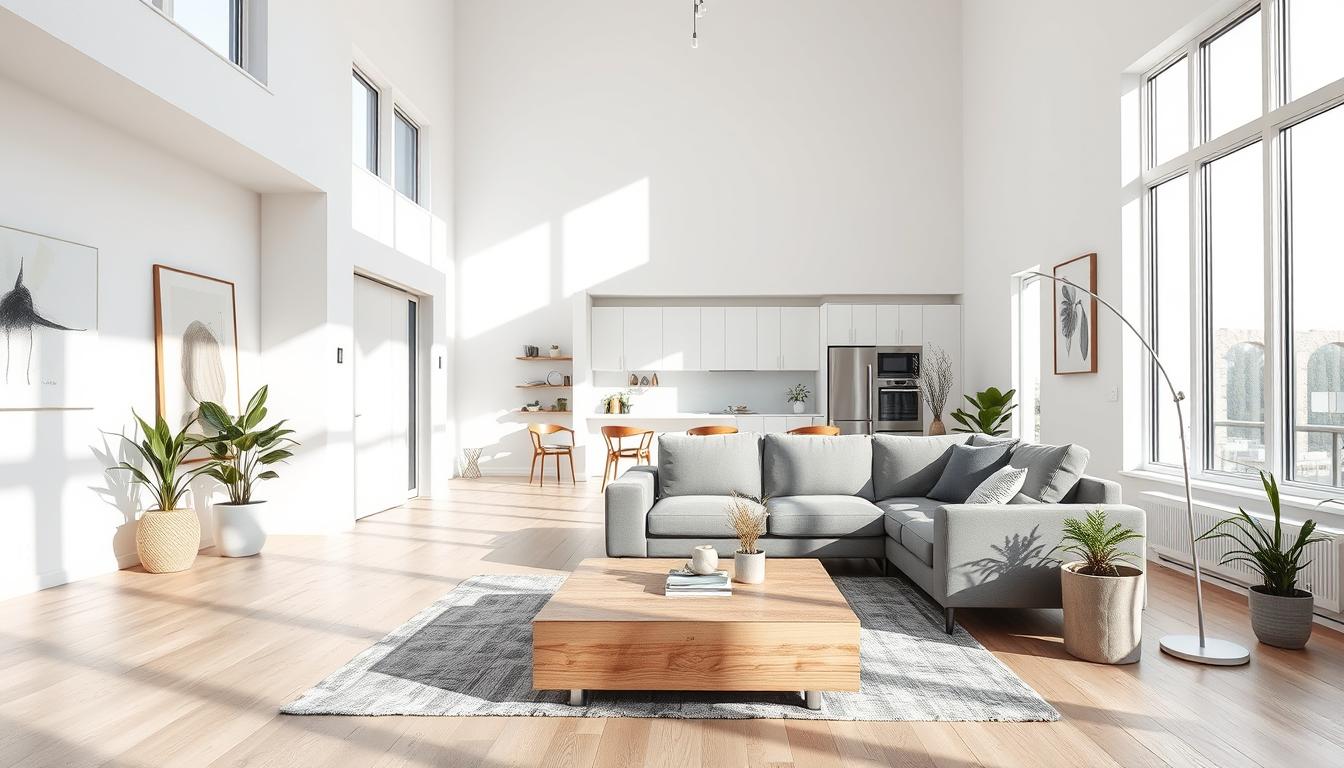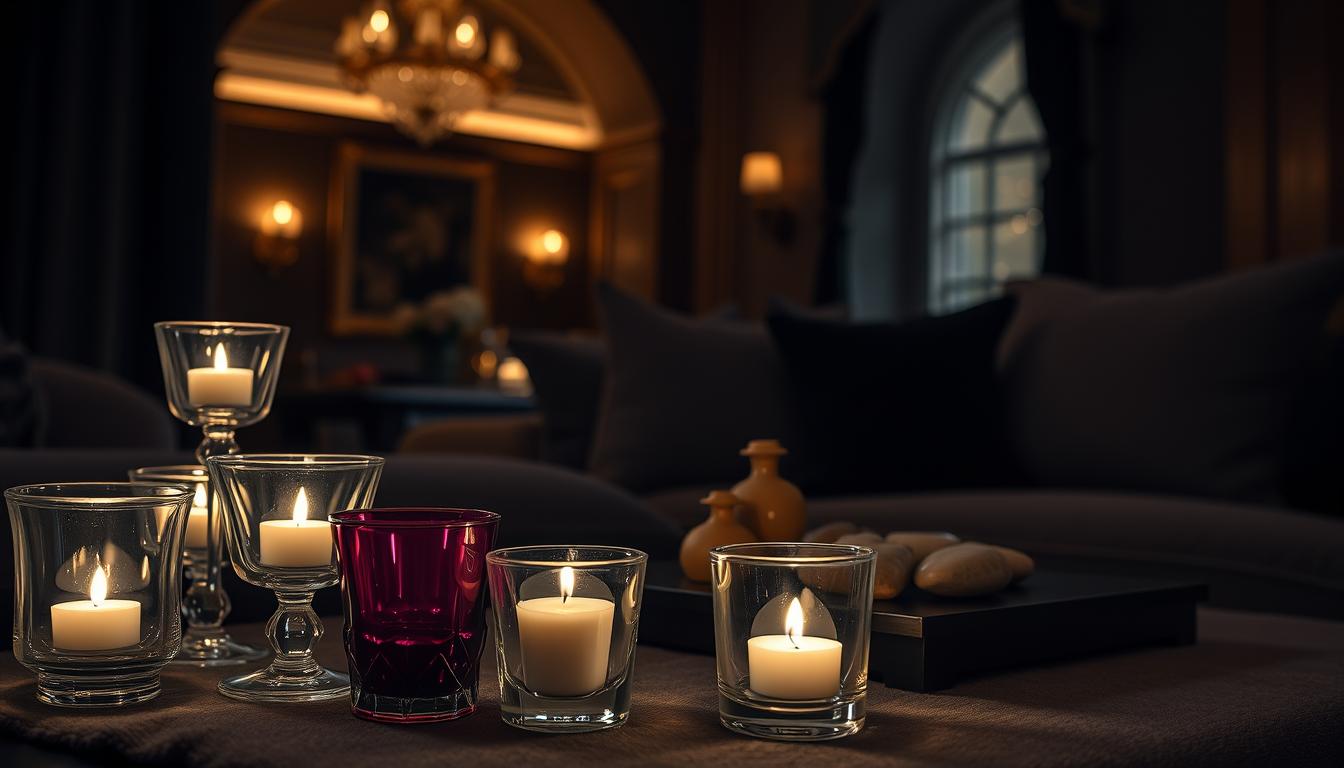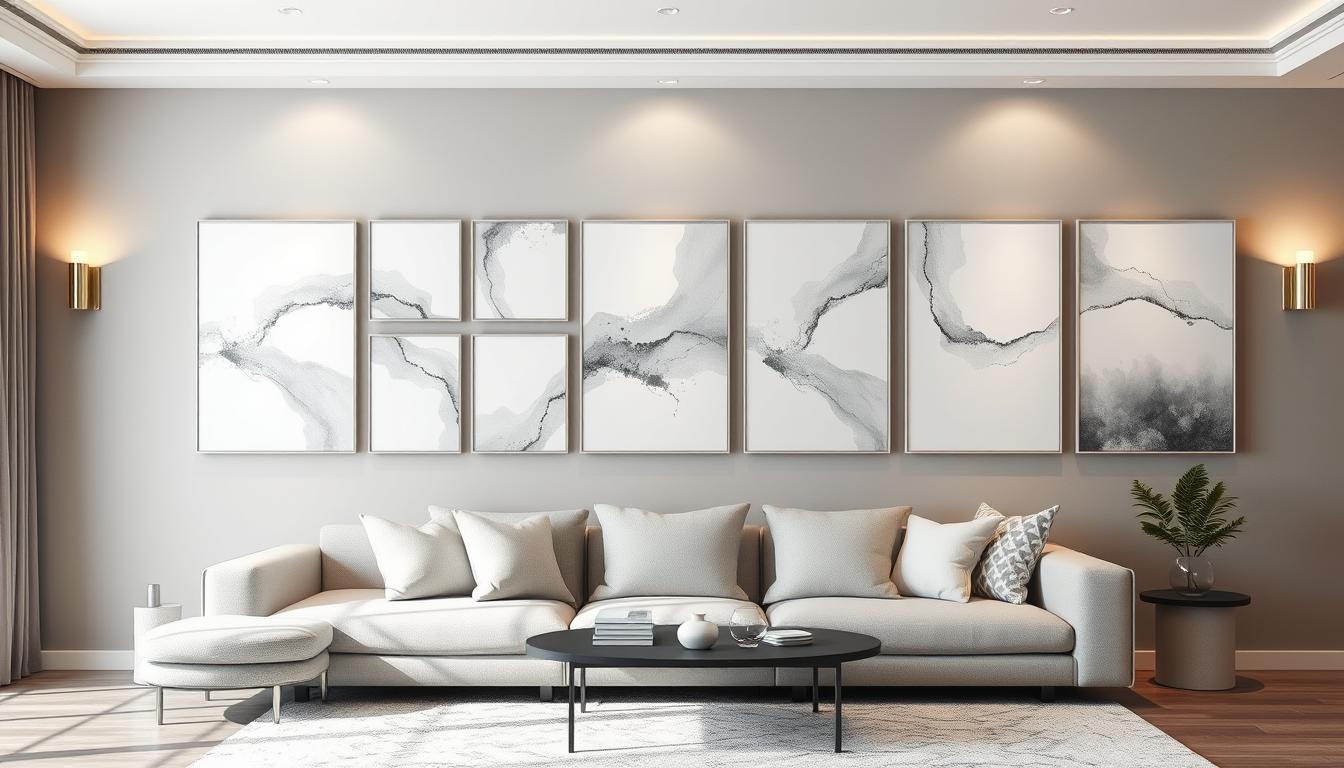Creating a stylish and functional living space is more than just a necessity; it’s an art form. With contemporary interior design ideas, you can turn your living area into a haven. It will reflect your personality and style.
As highlighted in various decorating secrets, adding meaningful elements is key. Also, arranging furniture well and using performance materials matter a lot. We will dive into these home and interior design ideas and more. This will help you make a space that’s both beautiful and functional.
Key Takeaways
- Transform your living area with contemporary interior design ideas
- Incorporate meaningful elements to give your space soul
- Optimize furniture arrangement based on room size and functionality
- Use performance materials to accommodate your lifestyle needs
- Create unique touches, such as hidden rooms or custom murals
Embracing Minimalism for a Clean Aesthetic
Minimalism is key in modern home design trends. It makes spaces clean and pleasing to the eye. It’s more than just design; it’s a lifestyle that values simplicity and function.
Minimalism turns living spaces into calm places. It helps rooms feel bigger and more open.
Key Principles of Minimalist Design
Minimalist design focuses on simplicity, function, and a few colors. To get the minimalist look, you need to declutter and choose only what’s essential.
- Use furniture that does more than one thing to cut down on clutter.
- Stick to a few colors to keep things looking good together.
- Bring in natural light to make your space feel bigger.
Choosing the Right Color Palette
The colors you choose are very important in minimalist design. Neutral tones like white, gray, and beige are popular for their calm feel. Think about the light in your space and the look you want.
Choosing the right colors can make your space look better together. It makes your minimalist design shine.
Incorporating Natural Light into Our Spaces
When we design our homes, adding natural light is key. It makes our spaces look better and improves our health.
More natural light makes our homes feel brighter and more welcoming. It also cuts down on the need for artificial lights, saving energy.
Benefits of Natural Lighting
Natural light is great for our mental health and makes us more productive. It also makes our homes feel bigger. Plus, it helps us sleep better by keeping our body clocks in check.
Some key benefits of natural lighting include:
- Enhanced mood and reduced stress levels
- Increased vitamin D levels due to sunlight exposure
- Improved concentration and productivity
Strategic Window Placement
Where we put windows is very important for getting more natural light. By planning carefully, we can make sure our homes are bright all day.
Here are some tips for placing windows:
- Orient windows towards the south to capture the most sunlight
- Use skylights or larger windows to illuminate interior spaces
- Avoid obstructing windows with heavy drapery or furniture
By using these strategies, we can make our homes not just look good but also be healthier and greener.
Selecting the Perfect Furniture for Functionality
Finding the right furniture is key to a great home. It’s not just about looks; it’s about being useful and comfy too.
When picking furniture, think about multi-functional pieces. These items do more than one thing. For instance, a storage ottoman can be a seat and a place to stash blankets or pillows.
Multi-Functional Pieces
Multi-functional furniture is a big help in small spaces or for those who want to tidy up. Think of a chess table that folds up or a coffee table with storage. These items save space and make rooms more useful.
- Storage beds with drawers underneath
- Nesting tables that can be easily stored
- Desks with built-in shelving
For more ideas on multi-functional furniture, check out our interior design services.
Balancing Comfort and Style
Function is important, but so is comfort and style. The furniture we pick should look good and feel great too.
Here are some tips:
- Go for furniture with simple designs for a modern vibe
- Pick fabrics and materials that are tough yet soft
- Make sure the furniture fits well in the room
By focusing on both looks and use, we can make spaces that are stunning and practical. Whether you’re into creative DIY home projects or need interior decorating tips, the right furniture makes a big difference.
Color Psychology: How Colors Affect Our Mood
The colors we pick for our homes can really change how we feel. When we design our homes, knowing how colors work is key. It helps us make spaces that feel welcoming and peaceful.
Colors do more than look good; they affect our feelings and actions. In home and interior design ideas, color psychology is very important. It makes our homes more livable and comfortable.
Understanding Warm vs. Cool Tones
Colors fall into warm and cool categories, each with its own mood. Warm colors like reds, oranges, and yellows make us feel energized and cozy. They’re great for places where we hang out, like living rooms and dining rooms.
Cool colors, like blues, greens, and purples, calm us down. They’re best for bedrooms and bathrooms, where we want to relax. Mixing warm and cool colors helps us create a balanced look that fits each room’s purpose.
Choosing Colors for Different Rooms
Choosing colors for each room depends on its use and the mood we want. For example, a home office might need colors that help us focus, like green or blue.
A bedroom should be calm and inviting for sleep. Soft colors like lavender or pale blue are perfect. Using color psychology helps us choose colors that make our homes better, following modern home design trends.
Color can really change our homes, making them look good and feel good. As we look at home and interior design ideas, remember the power of color. It shapes our daily lives in big ways.
Innovative Storage Solutions for Clutter-Free Living
In today’s fast world, we need smart storage to keep our homes tidy. A neat home looks better and feels calmer. Stylish accessories that also store things are key.
Creative Use of Vertical Space
Using vertical space is a smart way to store more. Tall shelves or cabinets make rooms feel taller. They add storage and style to our homes.
For example, floating shelves keep floors clear while showing off decor. Closet organizers also save space without taking up floor room.
Hidden Storage Ideas
Hidden storage keeps homes neat. It hides clutter, making rooms look tidy. Use under-bed containers, secret furniture spots, and hidden wall areas.
An ottoman with storage is a great spot for blankets and books. A storage coffee table holds remotes and magazines, keeping the living room neat.
| Storage Solution | Description | Benefits |
|---|---|---|
| Vertical Shelving Units | Tall units that maximize vertical space | Increased storage, aesthetic appeal |
| Hidden Compartments | Concealed storage in furniture or walls | Clutter-free living, organized space |
| Under-bed Storage | Containers or drawers under beds | Utilizes dead space, easy access |
Smart storage makes our homes neat and stylish. It’s all about using space well and hiding clutter. This way, our homes look great and feel peaceful.
The Impact of Textures in Interior Design
By mixing different textures, we can make our homes rich and layered. Textures make our spaces more welcoming and personal. They add depth and character to our living areas.
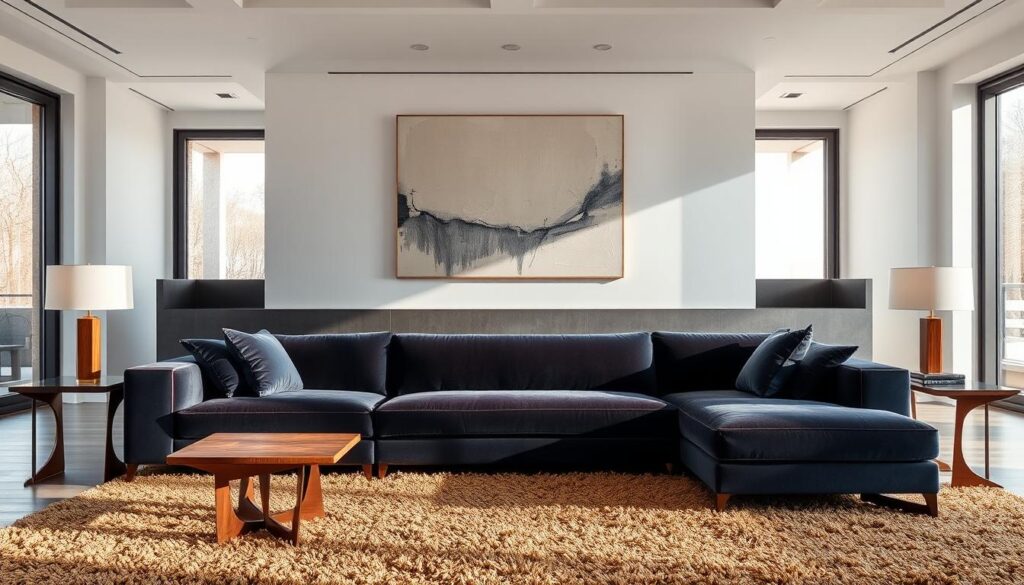
Textures can turn a simple room into something grand. “The right mix of textures makes a space lively and interesting,” says a top interior designer. They interact with light and our senses, offering a unique experience.
Combining Different Materials
Mixing materials is key in using textures in design. We can blend wood, metal, glass, and fabric for a striking contrast. For example, a leather sofa with a wooden coffee table adds texture to a room.
- Wood: Adds warmth and a natural feel
- Metal: Provides a sleek, modern touch
- Glass: Contributes to a sense of openness and elegance
- Fabric: Offers comfort and versatility in texture and pattern
It’s important to balance different materials. Too many can clutter a space, while too few make it dull. The goal is to find a balance that shows our style and complements the design.
Creating a Cohesive Look
To achieve a cohesive look, we must choose and combine textures wisely. We should think about the color palette, furniture style, and the desired aesthetic. By picking textures that work well together, we can create a unified space.
In a modern design, we might pair glass and metal with wooden accents. This mix adds interest and depth. As Elle Decor notes, “Mixing textures is about creating a dialogue between different elements in the room.”
Using textures effectively lets us add personality and style to our homes. By embracing a variety of textures and combining them thoughtfully, we can create a home that inspires and reflects our taste.
Integrating Technology into Home Design
Technology is now a key part of our homes, not just a trend. Smart devices and energy-saving tech make our spaces look good and work well. They also help us live more sustainably.
Smart Home Devices That Enhance Comfort
Smart home tech changes how we live. It includes voice-controlled lights and smart thermostats that learn our likes. For example, smart lights adjust to the time or activity, making our homes cozy for any moment.
A recent survey found homes with smart tech feel more comfortable and convenient.
“Smart home technology is not just about being trendy; it’s about creating a home that responds to your needs,”
says a leading expert in home automation.
Innovative Tech for Energy Efficiency
Technology also makes our homes use less energy. Smart thermostats and energy monitors help us save energy without losing comfort. For instance, smart thermostats adjust heating and cooling based on our schedules, saving a lot of energy.
Key Benefits of Energy-Efficient Technologies:
- Reduced energy consumption
- Lower utility bills
- Environmental sustainability
By adding tech to our homes, we get spaces that are smart, comfy, and green. As tech keeps improving, so will our homes.
Outdoor Spaces: Extending Our Living Areas
When we think about making our homes better, we often forget about the outdoor spaces. These areas can make our homes more useful and add places for fun and rest.
Outdoor spaces are key in home and interior design ideas. They help mix indoor and outdoor living. A good outdoor area can be a place to eat, relax, or enjoy nature.
Designing Functional Patios
Creating a great patio is more than picking furniture. It’s about making a welcoming and useful space. Here are some tips:
- Use furniture and decor that can stand up to the weather.
- Add lights to make your patio usable at night.
- Think about a pergola or canopy for shade.
A well-made patio can be the center of your outdoor area. It’s perfect for chilling out and hanging with friends. Adding stylish home accessories like outdoor rugs and throw pillows can make your patio unique.
| Patio Design Element | Purpose | Tips |
|---|---|---|
| Furniture | Provide seating and dining areas | Choose weather-resistant materials |
| Lighting | Extend evening use | Use solar-powered lights for energy efficiency |
| Shade Structures | Provide shade and protection | Consider pergolas or retractable canopies |
Ideas for Lush Gardens
Building a lush garden is more than just planting plants. It’s about making a beautiful and green space. Here are some ideas to start:
Picking the right plants for your area is key. Using native plants can save work and attract wildlife. Mix plants of different sizes and textures for a cool look.
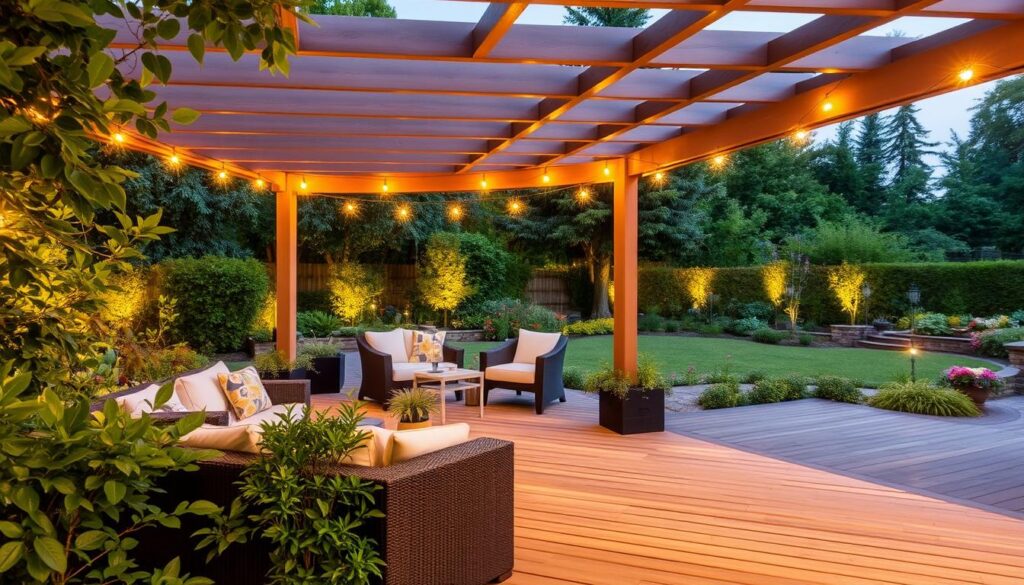
By adding these touches, we can make our outdoor spaces better. Whether it’s a cozy patio or a green garden, these areas can become our favorite places to relax and enjoy the outdoors.
Artistic Expressions in Our Interiors
Art can turn our homes into special places. By adding artwork and creative touches, we make our homes show who we are. This adds character and style.
The Role of Artwork in Home Design
Art is key in home design. It changes how a room feels and looks. Choosing the right art can make our homes more beautiful and look better together.
For example, a bold abstract art piece can stand out in a room. Black and white photos can add elegance. The trick is to mix art with room elements so it doesn’t feel too much.
DIY Art Projects to Personalize Our Space
Doing DIY art projects is a great way to make our homes unique. These projects let us show our creativity and make special pieces. We can paint old furniture or make wall hangings.
- Turn old items into decorations.
- Make a gallery wall with personal photos and art.
- Use stencils and paint for wall patterns.
DIY art in our homes adds a personal touch. It makes our spaces special and unique. This not only makes our homes look better but also gives us a sense of pride in what we’ve made.
Sustainable Design: Eco-Friendly Choices for Our Homes
Living sustainably begins at home. The right design choices can greatly reduce our environmental impact. Our homes are key in this journey towards a greener future.
Materials and Resources to Consider
Choosing the right materials for our homes can make a big difference. Using sustainable wood, recycled materials, and low-VOC paints helps reduce our environmental footprint.
| Material | Sustainability Features | Cost Effectiveness |
|---|---|---|
| Sustainable Wood | Renewable, biodegradable | Moderate to High |
| Recycled Materials | Reduces waste, conserves resources | Low to Moderate |
| Low-VOC Paints | Improves indoor air quality | Moderate |
Energy-Efficient Designs
Energy efficiency is vital in sustainable home design. Using energy-efficient appliances, smart home technologies, and proper insulation cuts down energy use. It also lowers our utility bills.
For more ideas on sustainable house design, check out this resource. It offers 21 innovative ideas for our next home project.
Trends in Interior Design We Love Right Now
As we keep making our homes better, it’s thrilling to see new interior design trends. We’re into styles that show who we are and make us feel good. Biophilic design and vintage & modern fusion are two big hits right now.
Nature-Inspired Living with Biophilic Design
Biophilic design brings nature inside our homes. It uses natural materials like reclaimed wood and stone. It also brings in lots of natural light.
This makes our homes feel like they’re part of the outdoors. It makes living inside better.
Vintage Meets Modern: A Fusion of Styles
Mixing vintage and modern styles is cool. It combines old charm with new looks. This mix makes our homes unique and stylish.
It also inspires us to get creative. We can turn old furniture into something new and modern.
These trends help us make our homes more personal. By using biophilic design and vintage & modern fusion, we create spaces that are both beautiful and meaningful.

